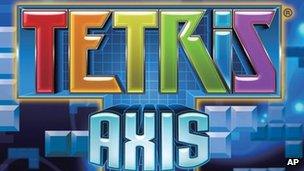How Tetris became the world's favourite computer game
- Published

Henk Rogers who owns the Tetris Company with Alexey Pajitnov, said he believed the game's theme of building was of universal appeal to players
In 1984 a Russian scientist invented what would become one of the most popular computer games ever; today it is estimated that at least a billion people have played Tetris.
It was created in 1984 by Alexey Pajitnov, a young researcher at Moscow's Academy of Science.
Bored by his job in the cybernetics department, he began using his love for mathematical puzzles to create a new computer game.
His inspiration was a board game called Pentomino, in which 12 different shapes made out of five squares are twisted and turned until they fit together in a box.
"You could spend a good couple of hours trying to do it and when I started programming this as a virtual game the Tetris idea kind of sparked," Mr Pajitnov said.
At that time there were very few computers in Moscow and researchers at the academy were forced to share, so very soon Mr Patijnov's colleagues were skiving off work to play the game.
"Everybody tried it and everybody loved it - including myself - and very soon the game just spread out from the computer centre across Moscow, then wider and wider," he said.
'Wild fire'
With the iron curtain still firmly in place, Moscow did not have anything resembling a computer industry and software was not for sale.
"The idea of receiving money for the programme seemed really strange and ridiculous at that time. So somehow Tetris was copied from my computer and from floppy disk to floppy disk - it just spread like wildfire," says Mr Pajitnov.
Tetris was passed between computer users the length and breadth of the Soviet Union and before long the government noticed that it had begun affecting productivity in the workplace.
In order to combat the problem they created an early form of spyware, which was installed on state computers to corrupt both Tetris and the floppy disk it originated from the moment the game was opened.
In the mid-1980s a British software manufacturer visiting an office in Hungary noticed the staff were playing with coloured shapes on their computers rather than engaging with their work.
Intrigued, he found out more about the game and went on to negotiate the distribution rights with the Russian government.
Before long, people in Europe and America were playing it at home. But the industry was moving fast and by the late 1980s the new platform was a handheld console like Game Boy.
Handheld revolution
Henk Rogers was an American software developer working in Japan who immediately saw the potential in Tetris.

Tetris became so popular that Soviet officials noticed it was causing workplace productivity to fall
"Most computer games are destructive but with Tetris you build something and I think that corresponds to some basic pleasure centre in humans," he says.
In 1989 Mr Rogers decided he wanted the distribution rights for handheld Tetris, so he packed his bags and without having any contacts in the USSR he jumped on a plane with a basic tourist visa and landed in communist Moscow.
"It was a little crazy, partly it was naïve and partly it was guts but also a lot of it was adrenaline - I just went for it," he says.
Mr Rogers was there to find ELORG, the new Soviet agency for the import and export of software.
But he found people in Moscow unhelpful. No matter whom he asked, no-one could tell him where the company was or even provide him with a telephone number.
After a few days of frustration Mr Rogers hired an interpreter, who helped him locate ELORG's offices, but when he arrived he was received by a shocked staff who were thrown by his unannounced visit; the usual protocol being a prior arrangement with permission from the KGB.
While he was there he met Alexey Pajitnov and they struck up what would become a long friendship.
"I had met businessmen before," Mr Pajitnov recalls, "but they were more like con-men. Henk was different - he really understood the game."
After a week of negotiations Mr Rogers won the officials over and he walked away with the rights for personal computers as well as handheld consoles.
Today Henk Rogers and Alexey Pajitnov together own the company that holds the rights to Tetris, where they continue to develop the game to fit with the latest technology.
To date, 70 million games have been sold in shops. It has been downloaded to 130 million phones and three million people a day play the game on Facebook.
Mr Rogers is sure that the game will never lose its ability to engage people.
"It is not like the Rubik's Cube or Pac-Man, Tetris is not a fad or a fashion and it will never fade into history; people will keep on playing it."